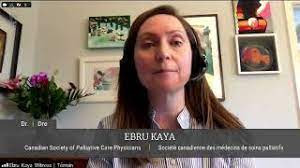Before completing the online euthanasia by advance request "consulation" please read our EPC guide to the consultation.
Alex Schadenberg
Executive Director, Euthanasia Prevention Coalition
Health Canada has opened an online "consultation" on Medical Assistance in Dying (euthanasia) by advance request. When completing the online "consultation" we felt that some of the questions were a sham because the questions imply that you support euthanasia by advance request. This is why EPC created a Guide to completing the online consultation
The "National conversation" on advance requests for medical assistance in dying will be open until February 14, 2025. The online consultation link is found on the Consultation website below the words - Join in: How to participate (Consultation Link).
Before completing the online consultation, please read our EPC guide to answering the online consultation.
Some people suggested that we boycott the "consultation." This is not the first Canadian government consultation that is a sham. EPC has produced a guide for our supporters to answer the online consultation questions.
Euthanasia was originally legalized in Canada under the guise of being limited to mentally competent aduls, who are capable of consenting and who freely "choose." Euthanasia by advanced request undermines these principles.
The first principle for the Euthanasia Prevention Coalition is that we oppose killing people.
Background to the "consultation."
The "consultation" was announced on October 28, 2024 by Health Minister, Mark Holland who was responding to the Québec government instituting euthanasia by advance request starting on October 30, 2024.
The Québec government announced on September 7 that they informed the provincial Crown prosecutor’s office to not prosecute medical practitioners who carry out euthanasia by advance request, so long as the medical practitioner complies with Québec law. The federal law does not permit euthanasia by advance request.
Euthanasia by advance request means that a person, while competent, legally declares their "wish" to be killed and if the person becomes incompetent, the person would then be killed, even though the person is not capable, at that time, of consenting.
It must be noted that every Canadian province has advanced directive laws. Therefore the federal government is considering an issue that is outside of their jurisdiction.
The
"National conversation" on advance requests for medical assistance in
dying will be open until February 14, 2025. The online consultation link is found on the Consultation website below the words - Join in: How to participate (Consultation Link).
EPC Guide to answering the online "consultation" questions.
Question 1: To what extent do you support or oppose Canada's current MAiD law pursuant to the above criteria and safeguards?
Response: Strongly oppose.
Question 2: To what extent would you support or oppose adults having the option of making an advanced request for MAiD, in the following situations:
(A) After a diagnosis of a serious and incurable medical condition that will lead to the loss of capacity to make decisions (for example: Alzheimer's Disease, Huntington's disease, Parkinson's disease)?
Response: Strongly oppose.
(B) While living with a medical condition that could lead to a sudden or unexpected loss of capacity to make medical decisions (for example: high blood pressure which could lead to a severe stroke)?
Response: Strongly oppose.
Question 3. What values guide you when thinking about advanced requests for MAiD? Check all that apply.
Response: Sanctity of life and/or Protection of vulnerable people.
Question 4. If the advanced requests for MAiD were permitted, how important would it be as an option for your formal personal health planning needs?
Response: Not at all important.
Question 5. The following considerations have been raised about advance requests. Check any of the considerations below that are a concern to you.
Response: A person could feel pressured by family or others to make an advance request and/or
A person could make an advance request before knowing how well they might adapt to (or tolerate) their medical condition with appropriate support in the future.
Question 6. Please specify other considerations about advance requests you have without providing personal identifying information (250 word limit). You can state what you want within a 250 word limit.
Response: Alex Schadenberg suggests using some of the following:
When euthanasia (MAiD) was legalized, Canadians were told that the law would be limited to: competent adults who are capable to consent and freely choose.
Euthanasia by advance request undermines these principles. Even though a person makes an advance request, the person when killed by euthanasia is not a competent adult, is not capable of consenting and cannot freely choose. Therefore, euthanasia by advance request is technically euthanasia without consent.
Once a person becomes incompetent, they are not legally able to change their mind, meaning that some other person will have the right to decide when the person dies, even when that person is happy with life.
If euthanasia by advance request is approved, the law will discriminate against incompetent people who did not make an advanced request. The law will be challenged and it will be argued that the person didn't make an advance request based on timing (the option didn't exist yet) or lack of knowledge that it was possible to make an advance request.
Once killing incompetent people is viewed as "compassionate" it will be considered cruel to not kill an incompetent person who is deemed to be suffering, because the person didn't make an advance request.
Advanced directives are also provincial not federal jurisdiction.
The next questions are problematic since they infer that you support euthanasia by advance request.
Question 7. Please rate the importance for you of the following potential conditions as safeguards when a person is developing their advance request.
A person must wait for a minimum period of time following their diagnosis of a capacity limiting illness before they can make an advanced request?
Response: Prefer not to say.
The person who makes the request must validate it periodically (such as every five years) and can withdraw and modify it at any time while they still have decision making capacity.
Response: Prefer not to say.
Question 8. Please rate the importance for you of the following potential conditions of safeguards when the individual is assessed for MAiD and MAiD is provided based on advanced request.
There must be a minimum assessment period during which the health care providers must evaluate and confirm the patient is demonstrating the conditions described in their advance request on a recurring basis and that they otherwise meet the eligibility requirement for MAiD.
Response: Prefer not to say.
Any provision of MAiD based on an advanced request must be provided in accordance with standards developed for health care professionals. (Ridiculous question)
Response: Prefer not to say.
Health care providers must be trained on the assessment and provision of MAiD based on an advance request.
(This is not helpful since the euthanasia doctors group - CAMAP - provides the training).
Response: Prefer not to say.
The advance request must be made using a government designated form, must be notorized or witnessed, and recorded in a person's medical record or a registry.
Response: Prefer not to say.
The person must be provided personal care planning by a healthcare professional or their team, including information on living with a capacity-limiting disease as well as available care and supports, as part of preparing an advanced request.
Response: Prefer not to say.
The person making the advance request must do so voluntarily and with the assistance of a health care professional who has received training related to the appropriate development of advance requests. (This is not helpful considering CAMAP will provide the training).
Response: Prefer not to say.
Question 9: Do you have any comments about other potential conditions and safeguards you think are needed for advanced request? To protect your confidentiality, please do not provide information that could be used to identify yourself or others (250 word limit).
Response: Alex Schadenberg responded in this manner.
Euthanasia by advance request should never be considered an option. The very premise of allowing euthanasia is that the person be a competent adult who is capable of consenting and freely "choosing." Euthanasia by advance request undermines any and all potential "safeguards" and opens the door to euthanasia of people who are incompetent and have not consented.
It is impossible to separate an act of killing an incompetent person for reasons of compassion, because the person indicated, out of fear or other situational reasons, that the person wanted to be killed under these circumstances. Euthanasia by advance request requires another person to decide when this person should be killed, knowing that the person is not competent to make the decision for themselves.
We shouldn't even be discussing this issue.
Advanced directives are also under provincial not federal jurisdiction.
Question 10: In addition to no longer having capacity to make decisions, do you think a person should be demonstrating another serious physical or psychological limitation (such as loss of ability to communicate or loss of ability to perform activities of daily living, like eating or dressing) in order to be eligible to receive MAiD based on their advance request?
Response: Prefer not to say.
Question 11: After a person has lost capacity to make decisions, should a person other than the person who made the advance request (such as a member of the family) have the authority to withdraw or modify the person's advance request. (Precendent would require an advanced directive, if specific, to be followed).
Response: Prefer not to say.
Question 12: Consider a person who no longer has the capacity to make decisions and meets all of the conditions outlined in their advance request that describe enduring and intolerable suffering and advance decline in capability, and yet they appear to be content. Select the statement that best describes what you think should happen next:
(You may think that the second answer is best except that the second answer requires the person to be reassessed at a later time for the purpose of killing.)
Response: Prefer not to say.
Question 13: How important would it be to have the same minimum eligibility criteria and safeguards permitting advance requests for MAiD apply across every province and territory in Canada? (This is a provincial jurisdiction)
Response: Not at all important.
The consultation ends with a series of demographic questions.



.png)

.JPG)
.JPG)





